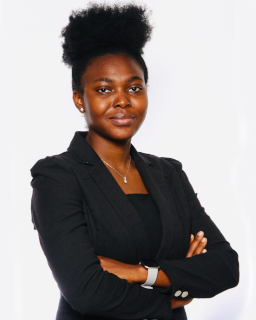Faculty of Law congratulates Prof. Faith Majekolagbe on grant success
Jyllian Park - 12 April 2023

In March 2023, Faith Majekolagbe, assistant professor with the Faculty of Law, was awarded two grants to assist in her research on intellectual property and the public interest — specifically, how to democratize access to data and support people engaging with copyrighted work for research purposes.
Majekolagbe, who joined the Faculty as an assistant professor in July 2022, has made a significant impact on the faculty in her short tenure. The recent news of her success is further proof of the direction she is giving to the field of intellectual property law.
“The faculty is thrilled that she has achieved grant success so quickly,” says Professor Ubaka Ogbogu, associate dean research for the Faculty of Law.
“This is a testament to the quality and relevance of her scholarly work and interests. It is very gratifying to celebrate Dr. Majekolagbe's achievements, which I know are just a scratching of the throat for what would undoubtedly be a noteworthy and celebrated career filled with similar and greater successes.”
Intellectual Property Legal Clinic
The first grant from Innovation, Science and Economic Development Canada (ISED) was awarded to Majekolagbe to support the development of a student-run legal clinic targeted at free or low-cost access to basic IP advisory services and foster the development of future IP experts.
“We want to have ready legal supports for entrepreneurs that are underrepresented in the innovation ecosystem in Canada. So women, indigenous innovators, minority innovators and others,” says Majekolagbe. “The legal clinic could provide free legal support in the form of legal information memos, seminars or webinars and draft legal agreements so that we can broaden the scope of innovators in Canada.”
To aid in the ISED grant application process, Majekolagbe was able to reference the work done by the existing legal clinic (River City Venture Clinic) at the University of Alberta to showcase how students at the faculty support entrepreneurs and small businesses.
“Their support made the process more seamless because I didn't have to create a clinic for the purpose of the grant. I could leverage that existing clinic to actually say, we have a law clinic already. It's not exclusively an IP law clinic, it is a law clinic that supports entrepreneurs and small business in different legal areas, including IP law.”
Copyright, Data Mining and Artificial Intelligence
Majekolagbe’s second grant is from the University of Alberta’s AI4 Society for a project titled Copyright, Data Mining and Artificial Intelligence: Promoting the Public Interest in Research and Innovation.
The project seeks to bring together a team of legal and non-legal researchers to consider important practical and technical issues in text and data mining, machine learning and the development of AI systems that implicate copyright rules in Canada.
“The project is looking at ways in which we can reduce the need for people to get licenses from copyright owners to do text and data mining, especially because text and data mining would usually involve large volumes of work,” says Majekolagbe.
She adds:
“It's not practicable to get licenses for the whole range of works that you want to mine for research purposes. The project looks at how not being able to get licenses for the whole range of work can affect your data set. In picking and choosing what you have access to, you reflect some materials but not others that may be important to your work. That affects the quality of research that you're doing or your outputs.”
Majekolagbe’s work will also examine what mechanisms currently exist within Canada’s copyright laws, how they can be used and the deficiencies that exist.
“My objective is to ensure that we have a system that can democratize innovation. Anyone can be a researcher. Anyone can be an innovator. The fact that someone doesn’t have the financial or other means to get the licenses should not deter them from being able to do the research they want to do.”
Next Steps
Majekolagbe is not done looking at how access to data can advance innovation in Canada and at a global level.
The next stage of her research is aimed at receiving funding to leverage text and data mining to preserve languages facing extinction, both here in Canada and in African countries.
The assistant professor’s continued focus and work in these essential areas of Canadian copyright law is charting a new path forward for the Faculty and has unyielding support from her colleagues across the university.
“As a professor and a scholar, Dr. Majekolagbe is leading the way in examining AI and other emerging technologies from a legal perspective,” says Dean Barbara Billingsley. “We are extremely fortunate to have her doing this important work at our Faculty and sharing her expertise with our students both in a classroom and clinic setting.”